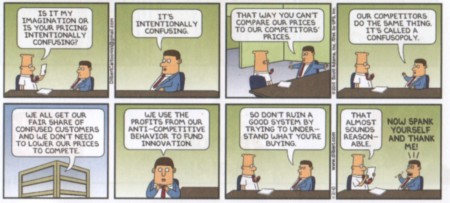Worldwide, governments are ‘in denial’ about the inevitability of higher energy prices. At least in public. Somehow – despite some intelligent policies – it has become impossible for politicians to speak honestly and with a longer term perspective.
- The supply of energy is critical to a nation’s security and this is a responsibility which governments cannot abdicate.
- But neither can governments wave a wand and make market forces disappear.
- Climate change is a reality and – eventually – governments will have to respond no matter how unpopular this is.
In the UK David Cameron promised to insist that companies sell energy at the cheapest price to their customers. It seems like a simple enough promise, but I have great faith the confusopoly will survive. Why?
Well firstly, neither governments nor customers are in any position to argue. The government sold national energy assets decades ago and cannot afford to buy them back. And the UK does not possess a great excess of energy supply capacity over energy demand. So one way or another, the customers will have to pay. We are in a tight corner.
Secondly, the UK government committed itself reducing carbon emissions to 20% of its previous level by 2050. To achieve this it offers subsidies to producers of renewable electricity and to homeowners who insulate their homes. These subsidies are paid for by increasing the price of electricity. I think this is intelligent, but many do not.
In the USA I was astonished to see presidential candidates trading statistics about which of them would increase coal mining and gas extraction faster and so lower prices. The US elections are essentially a popularity contest and so it is not really surprising to see such exchanges. But in reality electricity generation from coal is an environmentally disastrous technology and – in part driven by rulings from the Environmental Protection Legislation – it is already being replaced in the US by gas – which in the US is probably (borderline) a good thing.
In France – Mr Hollande is introducing a system in which he seeks to hold back market forces and to make the price of electricity depend upon who you are and where you live. This is an extension of the US system I described a few months ago in which electricity becomes more expensive the more you use – a market-based system which discourages excess use. The problem with the French system is that – like the common agricultural policy – it is massively bureaucratic and encourages people to extract the maximum subsidy rather than to reduce use.
In my opinion – and this is why I have never been a popular person – we should welcome increased energy prices relative to other costs. It means that renewable energy become more affordable. It means we will conserve energy more (while complaining I admit) and emit less carbon dioxide.
And if we want to spend money helping disadvantaged people – and I think we should – we should spend it to help them use less energy rather subsidising their use of more energy.
===============
‘Confusopoly‘: a small number of firms make the price of their offering so confusing that no one can work out which company offers the best deal. Mobile phone operators and Insurance Companies are the masters of this art, but Energy Companies give them a good run for their money.

October 29, 2012 at 10:39 am |
I would happily agree with you if such an important social resource was owned by the people through nationalisation.
October 29, 2012 at 4:39 pm |
Fair point. Looking back, it doesn’t seem like such a smart idea to have privatised our energy infrastructure. But it’s a bit late now.
December 11, 2012 at 1:01 pm |
the opposition get involved too: http://www.securingthefuture.co.uk/energy/14106-flint-angered-edf-price-hike Old people are dying of cold, how are the big 6 left to get away with it? This is a question of fairness and if the gov step in a sort it then fine. Otherwise better regulation than ofgem is needed.